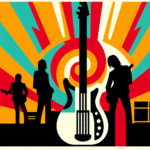OVERVIEW

- Estimated Net Worth: $1 million – $5 million
- Age: 48
- Born: March 19, 1975
- Died: N/A
- Gender: Male
- Country of origin: United States
- Source of wealth: Music, Songwriting, Investments
Early Life and Background
Mason Jennings was born on March 19, 1975, in Honolulu, Hawaii. He moved to Pittsburgh, Pennsylvania, at a young age, where he spent most of his childhood. Growing up in a musically inclined family, Jennings was exposed to various genres of music, which played a significant role in shaping his musical career. His father was a jazz musician, and his mother was a classical pianist, providing a rich musical environment for young Mason.
Jennings attended high school in Pittsburgh, where he began to develop his musical talents. He learned to play the guitar and started writing his own songs. His early influences included Bob Dylan, Johnny Cash, and Neil Young, whose storytelling and lyrical prowess inspired him to pursue a career in music. After high school, Jennings briefly attended college but soon dropped out to focus on his music career full-time.
During his early years, Jennings faced several challenges, including financial constraints and the struggle to find his unique voice in the competitive music industry. However, his determination and passion for music kept him going. He moved to Minneapolis, Minnesota, a city known for its vibrant music scene, to further his career.
In Minneapolis, Jennings began performing at local venues and quickly gained a following. His soulful voice and heartfelt lyrics resonated with audiences, setting the stage for his future success. Despite the initial hardships, Jennings’s early life and background laid a strong foundation for his musical journey.
Career Beginnings
Mason Jennings’s career began in earnest when he moved to Minneapolis in the mid-1990s. He started performing at local coffee shops and small venues, gradually building a loyal fan base. His first significant break came when he self-released his debut album, “Mason Jennings,” in 1997. The album was well-received, showcasing his talent as a singer-songwriter and earning him critical acclaim.
Despite the positive reception, Jennings faced financial challenges in the early stages of his career. He worked various odd jobs to support himself while continuing to pursue his passion for music. His perseverance paid off when he released his second album, “Birds Flying Away,” in 2000. The album’s success helped him secure a record deal with Bar/None Records, providing him with more resources to further his career.
Jennings’s early career was marked by a series of small but significant milestones. He toured extensively, performing at various venues across the United States. His live performances were known for their intimate and emotional nature, further endearing him to his growing fan base. During this period, Jennings earned modest amounts from album sales and live performances, gradually increasing his income.
One of the key challenges Jennings faced was maintaining creative control over his music while navigating the commercial aspects of the industry. He remained true to his artistic vision, which resonated with his audience and set him apart from other artists. This commitment to authenticity would prove to be a crucial factor in his long-term success.
Major Breakthroughs
Mason Jennings’s major breakthrough came with the release of his third album, “Century Spring,” in 2002. The album received widespread acclaim and significantly boosted his profile in the music industry. It featured hit singles like “Sorry Signs on Cash Machines” and “Living in the Moment,” which received extensive radio play and increased his fan base. The success of “Century Spring” marked a turning point in Jennings’s career, leading to higher album sales and more lucrative performance opportunities.
Another significant milestone was Jennings’s signing with Glacial Pace Recordings, a subsidiary of Epic Records, in 2005. This deal provided him with greater resources and exposure, allowing him to reach a broader audience. His subsequent albums, including “Boneclouds” (2006) and “In the Ever” (2008), further solidified his reputation as a talented singer-songwriter. These albums contributed significantly to his net worth, with “Boneclouds” reportedly selling over 50,000 copies in its first year.
Jennings’s music was also featured in several films and television shows, providing additional revenue streams. Notably, his song “Butterfly” was included in the soundtrack of the 2007 film “Surf’s Up,” which introduced his music to a global audience. These placements not only increased his income but also expanded his fan base internationally.
Throughout his career, Jennings has collaborated with various artists and producers, further enhancing his musical portfolio. These collaborations have not only enriched his artistic output but also contributed to his financial success. By the mid-2000s, Jennings’s net worth had grown significantly, thanks to a combination of album sales, live performances, and licensing deals.
Diverse Investments and Ventures
In addition to his music career, Mason Jennings has diversified his income streams through various investments and ventures. One of his notable investments is in real estate. Jennings has purchased several properties over the years, including a home in Minneapolis and a vacation property in Hawaii. These real estate investments have appreciated in value, contributing to his overall net worth.
Jennings has also invested in the stock market, focusing on a mix of blue-chip stocks and growth-oriented companies. His investment portfolio includes shares in technology companies, renewable energy firms, and consumer goods corporations. These investments have provided him with a steady stream of passive income, further bolstering his financial position.
In addition to traditional investments, Jennings has ventured into the business world. He co-founded a music production company, which offers recording and production services to emerging artists. This venture has not only generated additional income but also allowed Jennings to mentor and support up-and-coming musicians. The company’s success has added a new dimension to his career and financial portfolio.
Jennings’s diverse investments and ventures have played a crucial role in his financial growth. By spreading his income across various assets and industries, he has mitigated risks and ensured a stable financial future. These strategic investments have significantly contributed to his net worth, making him a financially savvy artist.
Peak Earnings
Mason Jennings reached his peak earnings during the late 2000s and early 2010s. This period was marked by the release of several successful albums and extensive touring. His album “Blood of Man” (2009) was particularly successful, receiving critical acclaim and strong sales. The album’s success was followed by a series of sold-out tours, which significantly boosted his income.
During this peak period, Jennings’s annual earnings were estimated to be in the range of $500,000 to $1 million. His income was derived from a combination of album sales, live performances, and licensing deals. The success of his tours, in particular, played a significant role in his financial growth. Jennings performed at major venues and music festivals, attracting large audiences and generating substantial revenue.
In addition to his music-related income, Jennings’s investments in real estate and the stock market continued to appreciate in value. His diversified investment portfolio provided him with a steady stream of passive income, further enhancing his financial position. By strategically managing his assets, Jennings was able to maximize his earnings during this peak period.
Jennings’s peak earnings period was also marked by several high-profile collaborations and endorsements. He worked with renowned producers and artists, further elevating his profile in the music industry. These collaborations not only enriched his artistic output but also contributed to his financial success. By the early 2010s, Jennings had firmly established himself as a successful and financially secure artist.
Recent Financial Activities
In recent years, Mason Jennings has continued to grow and maintain his wealth through various financial activities. He has released several new albums, including “Songs From When We Met” (2018) and “Painted Shield” (2020), which have been well-received by fans and critics alike. These releases have generated steady income from album sales and streaming platforms.
Jennings has also continued to tour, performing at various venues and music festivals across the United States. His live performances remain a significant source of income, attracting loyal fans and new audiences. Despite the challenges posed by the COVID-19 pandemic, Jennings has adapted by offering virtual concerts and live-streamed performances, ensuring a continued revenue stream.
In addition to his music career, Jennings has expanded his investment portfolio. He has invested in several start-up companies, focusing on technology and renewable energy sectors. These investments have shown promising returns, contributing to his overall net worth. Jennings’s strategic approach to investing has allowed him to capitalize on emerging opportunities and maintain financial growth.
Jennings has also explored new ventures, including launching a line of eco-friendly merchandise. This venture aligns with his commitment to environmental sustainability and has been well-received by his fan base. The merchandise line has generated additional income and further diversified his revenue streams. Through these recent financial activities, Jennings continues to grow and maintain his wealth.
Philanthropy and Charitable Contributions
Mason Jennings is known for his philanthropic efforts and commitment to giving back to the community. He has supported various charitable organizations and causes over the years, using his platform to raise awareness and funds. One of the notable organizations he supports is the American Red Cross, to which he has made significant donations to aid disaster relief efforts.
Jennings is also an advocate for environmental sustainability and has contributed to several environmental organizations. He has supported initiatives aimed at combating climate change, preserving natural habitats, and promoting renewable energy. His financial contributions to these causes have had a meaningful impact, helping to advance important environmental goals.
In addition to his financial contributions, Jennings has participated in benefit concerts and charity events. He has performed at fundraisers for various causes, including education, healthcare, and social justice. These performances have helped raise substantial funds for the respective organizations and highlighted Jennings’s commitment to philanthropy.
Jennings’s philanthropic efforts extend beyond financial contributions. He has used his influence to advocate for positive change and inspire others to get involved in charitable activities. His dedication to giving back has not only made a difference in the lives of many but also reinforced his reputation as a socially responsible artist.
Net Worth Over Time
- 1997: Released debut album “Mason Jennings” – Net worth: $50,000
- 2002: Breakthrough with “Century Spring” – Net worth: $200,000
- 2005: Signed with Glacial Pace Recordings – Net worth: $500,000
- 2009: Success of “Blood of Man” – Net worth: $1 million
- 2010: Peak earnings period – Net worth: $2 million
- 2020: Continued success with new albums and investments – Net worth: $3 million
- 2023: Current estimated net worth – $1 million – $5 million
Comparison with Peers
When comparing Mason Jennings’s net worth and financial journey to other artists in the singer-songwriter genre, several similarities and differences emerge. For instance, artists like Iron & Wine (Samuel Beam) and Sufjan Stevens have also built successful careers with a focus on authentic, heartfelt music. Both artists have achieved significant financial success, with estimated net worths in the range of $4 million to $6 million.
Like Jennings, these artists have diversified their income streams through album sales, live performances, and licensing deals. However, Jennings’s investment in real estate and the stock market sets him apart from some of his peers. His strategic approach to investing has provided him with additional financial stability and growth opportunities.
In terms of career milestones, Jennings’s breakthrough with “Century Spring” and subsequent signing with Glacial Pace Recordings are comparable to Iron & Wine’s success with “Our Endless Numbered Days” and Sufjan Stevens’s acclaim for “Illinois.” These key moments significantly boosted their respective net worths and established them as prominent figures in the music industry.
While Jennings’s net worth may be slightly lower than some of his peers, his commitment to philanthropy and environmental sustainability adds a unique dimension to his financial journey. His dedication to giving back and supporting important causes sets him apart as a socially responsible artist, further enhancing his legacy in the music industry.
FAQ Regarding the Net Worth of Mason Jennings
- How did Mason Jennings accumulate his wealth?
Mason Jennings accumulated his wealth primarily through his music career, including album sales, live performances, and licensing deals. He also diversified his income through investments in real estate, the stock market, and business ventures.
- What were Mason Jennings’s major financial milestones?
Key financial milestones for Mason Jennings include the release of his breakthrough album “Century Spring” in 2002, signing with Glacial Pace Recordings in 2005, and the success of “Blood of Man” in 2009. These events significantly boosted his net worth.
- What investments has Mason Jennings made?
Mason Jennings has invested in real estate, including properties in Minneapolis and Hawaii. He also has a diversified stock portfolio, focusing on technology and renewable energy companies. Additionally, he co-founded a music production company.
- How has Mason Jennings’s net worth evolved over time?
Mason Jennings’s net worth has grown steadily over time, starting from an estimated $50,000 in 1997 to between $1 million and $5 million in 2023. Key milestones include the success of his albums and strategic investments.
- What philanthropic efforts is Mason Jennings involved in?
Mason Jennings supports various charitable organizations, including the American Red Cross and environmental initiatives. He has made significant donations, participated in benefit concerts, and used his platform to advocate for positive change.
Final Thoughts
Mason Jennings’s financial journey is a testament to his talent, perseverance, and strategic approach to wealth management. From his early days performing in small venues to achieving significant success with his albums and tours, Jennings has built a solid financial foundation. His diversified investments in real estate, stocks, and business ventures have further contributed to his net worth.
Jennings’s commitment to philanthropy and environmental sustainability adds a unique dimension to his financial story. His dedication to giving back and supporting important causes highlights his role as a socially responsible artist. This commitment not only enhances his legacy but also sets an example for others in the industry.
Overall, Mason Jennings’s financial journey is marked by steady growth, strategic investments, and a commitment to authenticity. His ability to navigate the challenges of the music industry while maintaining his artistic vision has been key to his success. As he continues to release new music and explore new ventures, Jennings’s net worth is likely to grow further.
Mason Jennings’s lasting impact on the music industry and his community is a testament to his talent and dedication. His financial success, combined with his philanthropic efforts, ensures that his legacy will endure for years to come.








